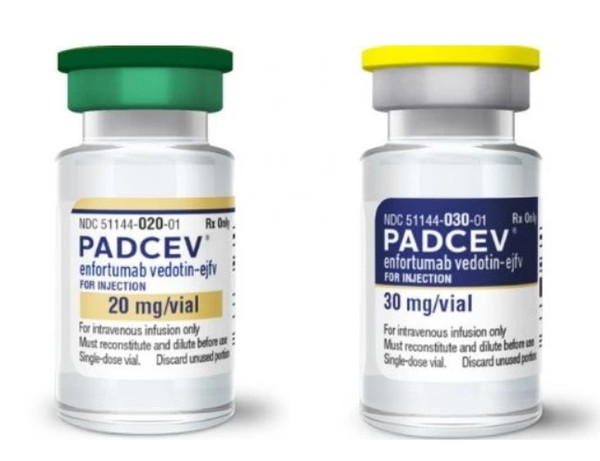Astellas Pharma, which is transforming into an anti-cancer drug developer, said its antibody-drug conjugate (ADC) Padcev (ingredient: enfortumab vedotin) received the first approval in Europe.
On Wednesday, Astellas announced that the European Commission authorized Padcev as monotherapy to treat adult patients with locally advanced or metastatic urothelial cancer who have previously received platinum-containing chemotherapy and a PD-1/L1 inhibitor.

Padcev is the first ADC anti-cancer treatment that Astellas jointly developed with Seagen.
Padcev combined a monoclonal antibody targeting Nectin-4, a protein highly expressed in urothelial cancer that contributes to tumor cell growth and proliferation, with anti-tumor agent monomethyl auristatin E (MMAE).
Recently, Astellas released the results of a study, saying Padcev extended the survival of urothelial cancer patients with a new mechanism.
The European approval for Padcev was based on the global phase 3 EV-301 trial outcome.
The study compared Padcev and the conventional chemotherapy in 608 patients with locally advanced or metastatic urothelial cancer who had been previously treated with a platinum-based chemotherapy and PD-1/L1 inhibitor.
The results showed that Padcev improved overall survival (OS) compared to chemotherapy.
On the interim analysis data of July 15, 2020, the median OS was 12.9 months in the Padcev group vs. nine months in the chemotherapy group. Padcev extended OS by 3.9 months and lowered the risk of death by 30 percent.
Median progression-free survival (PFS) was 5.6 months in the Padcev arm, while the chemotherapy arm was 3.7 months. Padcev reduced the risk of disease progression and death by 48 percent.
The most common adverse reactions with Padcev were alopecia, fatigue, decreased appetite, peripheral sensory neuropathy, diarrhea, nausea, pruritus, dysgeusia, anemia, weight decrease, maculopapular rash, dry skin, and vomiting.
“The EV-301 study is the first randomized trial to show improved OS in patients with advanced urothelial cancer who received a platinum-containing chemotherapy and an immunotherapy,” said professor Ignacio Durán at Hospital Universitario Marqués de Valdecilla, Spain.
“This approval of enfortumab vedotin from the European Commission is an important moment for these patients and their physicians.”
Ahsan Arozullah, vice president of Medical Sciences-Oncology at Astellas, said the EU’s approval of enfortumab vedotin was a significant milestone for patients with advanced urothelial cancer who have had limited treatment options and poor survival rates.
He added that Astellas would work with health authorities so that patients with advanced urothelial cancer can access the new treatment option as soon as possible.

